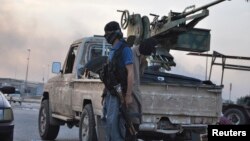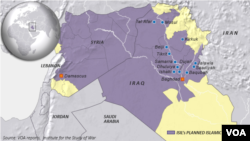WASHINGTON —
The Iraqi militants known as the Islamic State of Iraq and the Levant, or ISIL, have taken control of Iraq’s largest oil refinery in addition to a central bank and at least 12 towns and cities, including the country’s second largest, Mosul.
For some, the group’s advance into Iraq after fighting in Syria came as a shock, but taking over parts of Iraq was always at the top of ISIL's agenda - Syria was just a path to getting there.
Islamic state
ISIL Sunni extremists have long had a goal of trying to create an Islamic state, or caliphate, stretching across Iraq and Syria and possibly other parts of the Middle East.
The group came out of the ashes of the Islamic State of Iraq, which was led by Abu Musab al-Zarqawi, a Jordanian militant who died in 2006. After his death, it disbanded, resurfacing as al-Qaida in Iraq.
When its current leader, Iraqi-born Abu Bakr al-Baghdadi, was released from a U.S. prison in 2008, he reconstituted the I-S-I, the group of al-Zarqawi, adding the words “and al-Sham” (ISIS), which translates to “the Levant” (ISIL) or “Greater Syria.”
Loretta Napoleoni, an expert on terrorist financing, says the addition of Syria to the name was both a strategic and financial decision for Baghdadi.
“The same people who sponsored al-Zarqawi were sponsoring him to fight the Assad regime, because they wanted a regime change in Syria. But in reality what he did was use this money as a source of seed money to start his own independent financial construction to bankroll his return to Iraq.”
Napoleoni says the sponsors, whom she identified as individuals from Kuwait, Saudi Arabia and Qatar, were essentially “used” by Baghdadi, who spent his time in Syria to consolidate his group and build capital by smuggling and seizing strategic areas, particularly oil fields, held by other rebel groups.
“What they have done is sell oil or sell back some of the oil fields to the regime of Assad, and in exchange they got quite a lot of money. So with these funds they have accumulated in four years of civil war in Syria then they were able to move back to Iraq and launch their attack on the Sunni areas of Iraq. They have managed to construct their own economy, so they are totally independent, “ said Napoleoni.
Breaking ties with al-Qaida
And it is that independence, both in terms of finances and in direction, that led the al-Qaida command to strongly disavow any ties to the militant group.
“While they're an offshoot of al-Qaida, they have broken with al-Qaida and we have some pretty good reporting that they have fought with the al-Qaida affiliate in Iraq as well," noted Ken Pollack, a national security expert with the Brookings Institution.
"The al-Qaida affiliate still takes orders from Ayman al-Zawahiri and the al-Qaida leadership in Pakistan. ISIL doesn't; it does its own thing. But it shares the same very virulent form of Islamist ideology, it is absolutely determined to fight the Shia, and of course Iraq is dominated by a Shia government," Pollack added.
The militants also are estimated to have thousands of fighters, many of them Westerners who believe in the vision of a borderless caliphate. Baghdad hopes the militants can be stopped before it comes to that.
For some, the group’s advance into Iraq after fighting in Syria came as a shock, but taking over parts of Iraq was always at the top of ISIL's agenda - Syria was just a path to getting there.
Islamic state
Islamic State of Iraq and the Levant
Islamic State of Iraq and the Levant- Formed by members of al-Qaida-linked groups in Syria and Iraq
- Aims to establish an Islamic emirate across Syria and Iraq
- Led by Abu Bakr al-Baghdadi, former leader of al-Qaida in Iraq
- Believed to have 5,000 to 7,000 fighters
- Has launched high-profile attacks in both countries
The group came out of the ashes of the Islamic State of Iraq, which was led by Abu Musab al-Zarqawi, a Jordanian militant who died in 2006. After his death, it disbanded, resurfacing as al-Qaida in Iraq.
When its current leader, Iraqi-born Abu Bakr al-Baghdadi, was released from a U.S. prison in 2008, he reconstituted the I-S-I, the group of al-Zarqawi, adding the words “and al-Sham” (ISIS), which translates to “the Levant” (ISIL) or “Greater Syria.”
Loretta Napoleoni, an expert on terrorist financing, says the addition of Syria to the name was both a strategic and financial decision for Baghdadi.
“The same people who sponsored al-Zarqawi were sponsoring him to fight the Assad regime, because they wanted a regime change in Syria. But in reality what he did was use this money as a source of seed money to start his own independent financial construction to bankroll his return to Iraq.”
Napoleoni says the sponsors, whom she identified as individuals from Kuwait, Saudi Arabia and Qatar, were essentially “used” by Baghdadi, who spent his time in Syria to consolidate his group and build capital by smuggling and seizing strategic areas, particularly oil fields, held by other rebel groups.
“What they have done is sell oil or sell back some of the oil fields to the regime of Assad, and in exchange they got quite a lot of money. So with these funds they have accumulated in four years of civil war in Syria then they were able to move back to Iraq and launch their attack on the Sunni areas of Iraq. They have managed to construct their own economy, so they are totally independent, “ said Napoleoni.
Breaking ties with al-Qaida
And it is that independence, both in terms of finances and in direction, that led the al-Qaida command to strongly disavow any ties to the militant group.
“While they're an offshoot of al-Qaida, they have broken with al-Qaida and we have some pretty good reporting that they have fought with the al-Qaida affiliate in Iraq as well," noted Ken Pollack, a national security expert with the Brookings Institution.
"The al-Qaida affiliate still takes orders from Ayman al-Zawahiri and the al-Qaida leadership in Pakistan. ISIL doesn't; it does its own thing. But it shares the same very virulent form of Islamist ideology, it is absolutely determined to fight the Shia, and of course Iraq is dominated by a Shia government," Pollack added.
The militants also are estimated to have thousands of fighters, many of them Westerners who believe in the vision of a borderless caliphate. Baghdad hopes the militants can be stopped before it comes to that.


